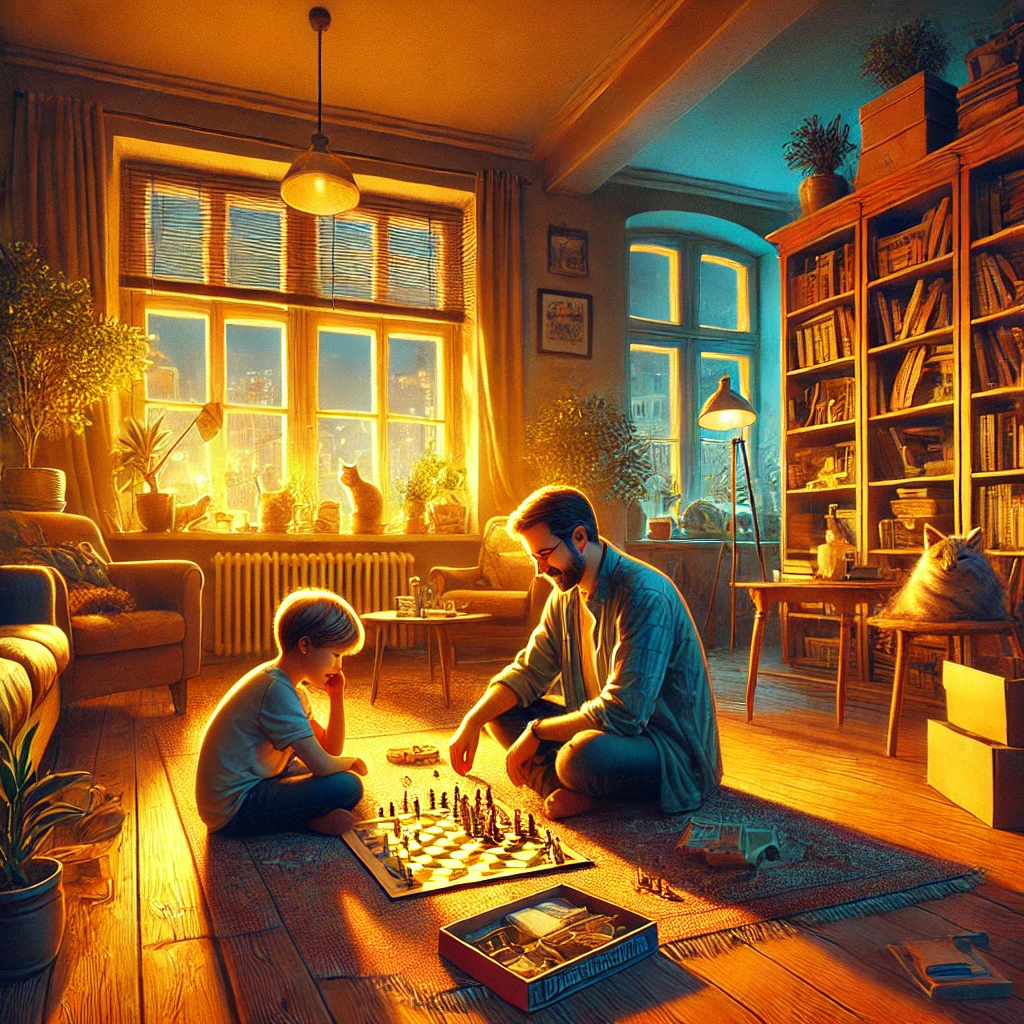Have you ever found yourself more in tune with the latest video game than with your son’s day? If so, you’re doing it wrong. In a world where screens dominate our lives, it’s easy to get caught up in the digital noise and lose sight of what’s really important—our relationships with our children. The idea of “disconnecting to reconnect” might sound simple, but in practice, it can be a game-changer for your relationship with your son.
So, what does it mean to disconnect? It means turning off the TV, shutting down the video games, and putting away the smartphones. It means clearing your mind of the digital noise and making space for real, meaningful connections. For fathers, this can be the difference between having a distant, distracted relationship with your son or forging a bond that’s strong, deep, and lasting.

The Screen-Free Experiment: What Happens When You Turn It All Off?
A few months ago, my family decided to go screen-free. No TV, no video games, no endless scrolling on our phones. And I can tell you, the difference has been a complete 180. Not that our relationship was ever bad—far from it. But now, my son and I are closer than ever. We hang out more, talk more, and, most importantly, we’re more present in each other’s lives.

Before this experiment, my son was consumed by screens. All he ever wanted to do was play video games, watch TV, and talk about, you guessed it. VIDEO GAMES. It was as if his entire world revolved around the screen. But now, that creative spark that had been buried under layers of pixels has come alive. He’s more imaginative, more curious, and more engaged with the world around him.
The Science Behind the Screen Addiction

It’s no secret that video games have a unique pull on the boys brain. There’s something about the challenge, the competition, and the reward system that seems to tap into a unique part of our psyche. While it’s true that girls can also get hooked on screens, the intensity and obsession seem to be more pronounced in boys.
Research suggests that the dopamine release triggered by video games can create a cycle of addiction that’s hard to break. This isn’t just a matter of preference; it’s a biological response that can have serious consequences on a child’s development. The more time your son spends in front of a screen, the less time he’s spending using his imagination, developing social skills, and learning to navigate the real world.
Reconnecting with Your Son: Practical Tips for Dads
So, how do you start the process of disconnecting and reconnecting with your son? Here are some tips that can help you make the transition:

1. Set Clear Boundaries: The first step is to set clear boundaries around screen time. This might mean no screens during meals, no video games on weekdays, or a strict limit on daily screen time. Whatever rules you set, make sure they’re consistent and that everyone in the family follows them. If you can quit cold turkey and power through the first couple of days, you can quickly be free of those digital chains.
2. Find Alternatives: Once the screens are off, you need to find other activities to fill the time. This could be anything from playing sports, building a model, going on a hike, or simply playing a board game. The key is to find activities that you can do together, that are engaging, and that promote creativity.
3. Be Present: It’s not enough to just be physically present; you need to be mentally present as well. This means putting away your phone, really listening when your son talks, and engaging in conversations that matter.
4. Lead by Example: Your son is watching you, even when you think he’s not. If you’re constantly on your phone or glued to the TV, he’s going to follow your lead. Set a good example by limiting your own screen time and being more present in your daily life. Don’t be lazy, your boys are growing and you are to busy watching football.
5. Unplug the Router: If your son has a hard time breaking away from screens, sometimes the best solution is to remove the temptation entirely. Unplug the router, if he cries about it. GOOD! Do not give in, he will get over it.
The Benefits of Reconnecting: What You Can Expect
Once you’ve made the effort to disconnect and reconnect, you’ll start to see the benefits in your relationship with your son. Here are some of the changes you might notice:

– Improved Communication: Without screens to distract you, you’ll find that you and your son talk more—and not just about superficial things, but about what really matters.
– Stronger Bond: As you spend more time together, you’ll naturally grow closer. You’ll develop a bond that’s based on shared experiences, mutual respect, and genuine affection.
– Enhanced Creativity: With screens out of the picture, your son will have more time and mental space to explore his creativity. Whether it’s building with Legos, drawing, or learning to play Pokemon, you’ll see his imagination come to life.
– Better Behavior: Many parents report that when their kids spend less time on screens, they’re better behaved. They’re less likely to be moody, more cooperative, and more engaged in family life. We can confirm this is the case with all 3 of ours, they are more wonderful now than ever.
– Lasting Memories: The time you spend with your son now will create memories that last a lifetime. Whether it’s a simple game of basketball, a deep conversation, or a fun day out, these moments will stay with both of you forever.
Navigating the Screen-Free Journey: Answers to Common Concerns
Every child is different, so the time it takes to see a difference after going screen-free can vary. However, most parents start to notice positive changes within the first week. The key to success is consistency and patience as your child adjusts to the new routine.
It’s natural for children to resist the idea of going screen-free, especially if they’re used to spending a significant amount of time in front of screens. But it’s important to stay firm. If you can go cold turkey and stick to your decision, you’ll find that this approach often works best in the long run.
While it might be tempting to allow some screen time, especially when your child pushes back, it’s important to remember that screen time isn’t a necessity. It’s not like food or water—your child will be just fine without it. Power through the first few days, find engaging activities to fill the void, and you’ll see that it’s worth it.
If you’re worried about not having enough time to spend with your son, remember that quality matters more than quantity. Even if you only have an hour or two each day, make sure that time is spent actively engaging with your son rather than passively watching TV or playing video games. If possible, consider finding a job with more flexibility, such as working from home, to allow more meaningful time together. After all, your son deserves the best of you, and the time you invest now will pay off in the future.
Disconnect to Reconnect and Reap the Rewards
In today’s fast-paced, screen-saturated world, it’s easy to lose sight of what really matters—our relationships with our children. But by making the conscious choice to disconnect from screens and reconnect with our sons, we can build stronger, more meaningful bonds and in turn create wonderful husbands and fathers of the future.
So, if you’re a father and you’ve noticed a disconnect with your son, take a step back, turn off the screens, and invest in real, face-to-face time together. It won’t always be easy, but the rewards are more than worth it. After all, the most valuable thing you have in this world isn’t your job, your car, or your phone—it’s the time you spend with your son. Don’t waste it!
Final Thoughts

In the words of David Goggins, “It’s easy to be great when everyone else is weak!” Don’t let the digital world weaken your relationship with your son. Take control, set boundaries, and reconnect in a way that’s meaningful, memorable, and life-changing. Disconnect to reconnect—it’s the best decision you’ll ever make.
By focusing on these key points and taking actionable steps, you can create a lasting, positive impact on your relationship with your son. Remember, it’s not about being perfect—it’s about being present. Disconnect to Reconnect with Your Son!
Let’s reclaim what is rightfully our’s in this digital noise we live in. Join us in this exploration of how deep the rabbit hole actually goes.

No responses yet